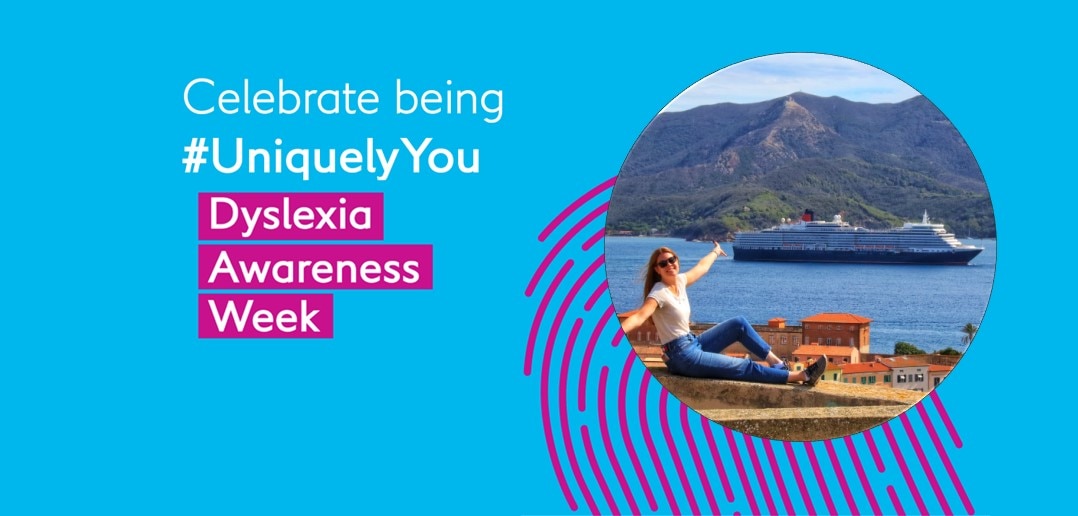This week (2-8 October) is Dyslexia Awareness Week. A chance to celebrate and learn from individuals with dyslexia from all backgrounds and walks of life. Dyslexia is a learning difficulty that primarily affects the skills involved in accurate and fluent reading and spelling. It occurs regardless of education, gender, age, ability, or ethnicity. One in 10 people have dyslexia, so chances are you will know someone affected by it.
In terms of strengths, people with dyslexia can be great at problem solving and coming up with innovative solutions. They are especially approachable, compassionate, and understanding. They are empathetic to what’s going on for others and take time to understand different points of view. They can often visualise something and articulate it verbally in a way that’s understood, helping people engage with ideas or concepts.
In terms of challenges, people with dyslexia may have difficulty processing and remembering information they see and hear which means it can impact their organisation skills, processing skills, their memory, and their self-esteem.
Celebrate being uniquely you.
Each person with dyslexia experiences it in a unique way, with their own set of strengths and challenges. This year’s Dyslexia Awareness Week campaign #UniquelyYou celebrates the diversity of the dyslexic community and the rich variety of lived experiences of dyslexia.
Faine Bellord, Email Marketing Executive, Cunard, shares her own experience, and having recently signed up to be Mental Health Champion, wanted to shed some light on the impact having dyslexia can have on a person’s mental health.

Faine’s Story
I was diagnosed as on the dyslexic spectrum as a child in primary school after teachers noticed I was behind with my reading and writing ability compared to my peers. The rest of my school experience was difficult and frustrating at times. I was always very keen to learn, but my grades limited my options, both at school and for further education. I would often feel misunderstood and not taken seriously. This had an impact on my self-confidence, both at school and into my adult life. It manifested into an anxiety disorder in my early 20s, impacting my university experience.
I have been able to learn to manage my mental health through CBT (Cognitive Behavioural Therapy) and, through my own continued research into dyslexia, I have developed a strong understanding of myself and my needs. After much determination and persistence, I have also been able to significantly improve my reading and writing ability, developing a love of writing in the form of poetry and personal blogs (like this one!) as a hobby. I’ve also found that I enjoy reading non-fiction and factual books about subjects I’m interested in, although it still takes me a very long time to get through a book as I can only manage about one or two chapters at a time without getting mentally fatigued.
I am extremely grateful that I’ve been able to find a job role that I love, where I can use my strengths in creativity and design, and work with a supportive team that advocate for flexibility and autonomy.
My final thoughts:
For people with dyslexia, the brain just works differently. It is often labelled as one of two extremes – a disability or a superpower. It is, to a certain extent, both of those things, but first and foremost it is a type of neurodiversity. We need to see it as this – a different way of thinking – focusing on just the positives or negatives can neglect the other, further creating misconceptions about dyslexia.
A huge thank you to Faine, for sharing her story. What makes you, #UniquelyYou? Why not share in the comments?
At Carnival UK, we’re passionate about creating a great place to work and keeping all our people safe and well. This means supporting employees to do their best, and be their best, whilst at work. Around 1 in 7 people in the UK are neurodiverse, meaning their brain may function, process, and learn information differently to someone who is neurotypical. This means many of our colleagues will be neurodiverse.
If you’re a manager, download our guide to help you understand more about neurodiversity and the actions you can take to support colleagues to be their true selves. Click here to download the guide.

